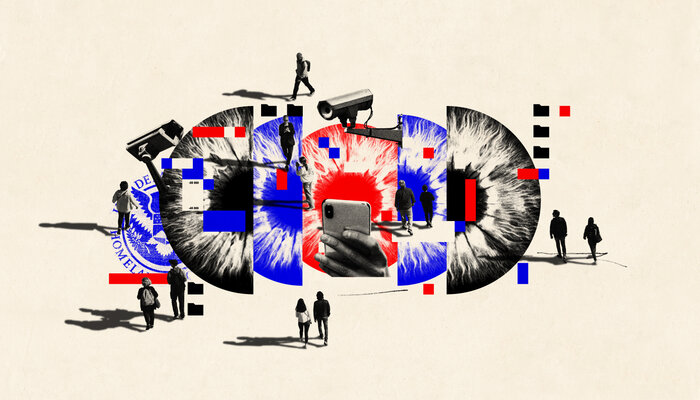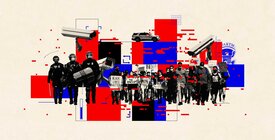
Holding Homeland Security Accountable
Reforms to focus DHS’s work and guard against overreach depend on strengthened internal oversight offices.

Part of
The Department of Homeland Security (DHS) was created hastily as part of the sweeping U.S. response to the terrorist attacks of September 11, 2001. With some 260,000 full-time employees and an annual budget of $103 billion, the sprawling agency is a ubiquitous facet of American life. As the Brennan Center demonstrates in its DHS at 20: An Agenda for Reform series, which builds on years of research on terrorism prevention, social media monitoring, and surveillance, the department’s programs are plagued by an overbroad mandate that gives its agents huge latitude and scant guidance. Previous reports in this series have advised focusing DHS’s work and strengthening safeguards against overreach.1 This report details the internal oversight reforms that must accompany these changes.
Congress has codified the protection of civil rights, civil liberties, and privacy as departmental obligations. DHS’s mission statement espouses a commitment to American values, which it does not define but which presumably reflect these protections.2 Several headquarters oversight offices within DHS are meant to uphold these responsibilities, including the Office for Civil Rights and Civil Liberties (CRCL), the Privacy Office, and the Office of Inspector General (OIG). Certain headquarters operational divisions, such as the Office of Intelligence and Analysis (I&A), and subdivisions within DHS components also perform oversight, liaise with headquarters oversight offices, and conduct internal affairs inquiries. Finally, the Privacy and Civil Liberties Oversight Board (PCLOB), an independent executive agency that reviews government counterterrorism activities and advises the president, has jurisdiction over DHS.
Yet the existing mechanisms for oversight and accountability are too weak to check the department’s expansive authorities and operations. They have proved ineffective to protect the values that DHS purports to uphold. By ceding to law enforcement operations and priorities, they have paved the way for the excessive surveillance and aggressive counterterrorism practices that DHS has become notorious for.
The various oversight offices within DHS have two roles to play. First, they must effectively advise operational and policy decision-makers before the department takes any action. They must determine whether a proposed initiative should be modified or even abandoned to avoid potential civil rights, civil liberties, or privacy harms. Oversight offices must set meaningful guardrails, determine how to implement them, and communicate them clearly both internally and to the public. This work must be robust and uncompromising.
Second, effective oversight offices must investigate errors and reported abuses, issue corrective action, and hold DHS accountable to the people it has harmed. When the department oversteps its bounds, its oversight offices should systematically determine what went wrong, who was harmed, and how it happened. They should then explain publicly what happened, determine and communicate appropriate changes going forward, and offer meaningful redress to affected individuals for the damages they suffered.
Today, oversight at DHS falls far short in both of these essential roles. Oversight offices have limited access to records. They lack independence and standing in the department’s political structure. And they struggle with transparency. Headquarters oversight lacks leverage in component oversight offices, which are all woefully understaffed relative to DHS’s immense operational workforce. Furthermore, the reporting lines at those component offices sideline CRCL and the Privacy Office.
Remedies designed to make whole the people harmed by DHS activities are also weak. No cause of action against federal officials exists for civil rights violations, and money damages are rarely available for such harms. The judiciary, meanwhile, has chiseled away at First, Fourth, Fifth, and Sixth Amendment protections.
But there is a way forward.
First, the DHS secretary should increase the prominence, independence, and access of CRCL and the Privacy Office. Whereas the Privacy Office is already authorized by statute, CRCL’s oversight authorities must be strengthened (including in statute by Congress), and both offices need a stronger presence throughout DHS, not just at headquarters.
Second, the secretary should direct and empower CRCL and the Privacy Office to step up their reporting on how the department affects Americans. CRCL should release public assessments of proposed operations, and the Privacy Office should revise its current assessment program to ensure that its reports present clear, relevant, and up-to-date information. The status quo serves to obfuscate, not illuminate, DHS programs impacting the American public.
Third, while conducting its programmatic and criminal inquiries, OIG should scrutinize the department’s claims about program effectiveness and determine whether DHS activities violate civil rights, civil liberties, and privacy. It also should report on its investigations and their outcomes publicly and in greater detail.
Fourth, the PCLOB should perform an in-depth review of DHS’s oversight framework — its successes, failures, and missed opportunities — and offer recommendations to bolster its regulatory functions. Several of the board’s ongoing inquiries relate to DHS programs, but their results likely will not be released publicly because they were initiated by the department as requests for advice. As much information as possible from these inquiries should be made available to the public.
Finally, Congress should codify improved oversight structures within the department and conduct regular public hearings and investigations into DHS oversight. It must also strengthen remedies available to members of the public for abuse by federal agents, including by recognizing constitutional tort claims in statute.
Notas al Pie
-
1
For instance, A New Vision for Domestic Intelligence recommends ending the sharing of social media intelligence about Americans and the practice of interviewing incarcerated persons, as well as the creation of better protections for Americans’ information. Stronger Rules Against Bias offers solutions to long-standing issues of profiling. And Ending Fusion Center Abuses proposes a novel, robust federal oversight mechanism for the national network of fusion centers. See Spencer Reynolds and Faiza Patel, A New Vision for Domestic Intelligence: Fixing Overbroad Mandates and Flimsy Safeguards, Brennan Center for Justice, March 30, 2023, https://www.brennancenter.org/our-work/policy-solutions/new-vision-domestic-intelligence; Harsha Panduranga and Faiza Patel, Stronger Rules Against Bias: A Proposal for a New DHS Nondiscrimination Policy, Brennan Center for Justice, updated September 15, 2022, https://www.brennancenter.org/our-work/policy-solutions/stronger-rules-against-bias; and Michael German, Rachel Levinson-Waldman, and Kaylana Mueller-Hsia, Ending Fusion Center Abuses: A Roadmap for Robust Federal Oversight, Brennan Center for Justice, December 15, 2022, https://www.brennancenter.org/our-work/policy-solutions/ending-fusion-center-abuses. -
2
DHS’s mission statement reads, “With honor and integrity, we will safeguard the American people, our homeland, and our values.” Department of Homeland Security (hereinafter DHS), “Mission,” last updated February 26, 2023, https://www.dhs.gov/mission. The department does not specify which “values” it protects and puts them last in its series of duties. But the promise — and opportunity— to defend American ideals as well as people is one of its stated commitments.
Más sobre la Reform Agenda for the Department of Homeland Security series
-
Overdue Scrutiny for Watch Listing and Risk Prediction
Programs that determine people’s ability to travel are rife with civil liberties abuses, and the government has not demonstrated that they keep Americans safe. DHS must adopt transparency and accountability measures. -
A New Vision for Domestic Intelligence
The Department of Homeland Security needs new rules and stronger oversight to better protect civil rights and civil liberties. -
Ending Fusion Center Abuses
The federal government provides state and local intelligence hubs with funding, personnel, and database access — all without adequate oversight.




